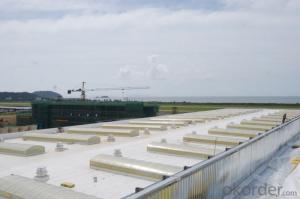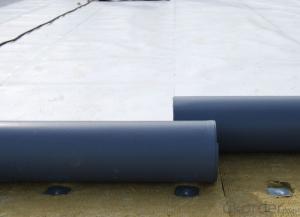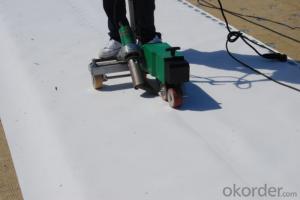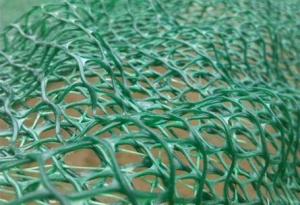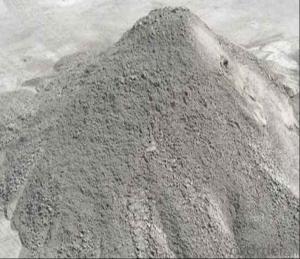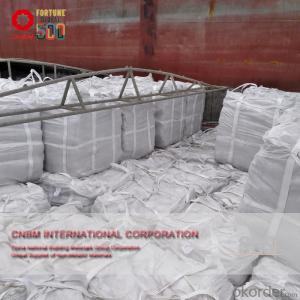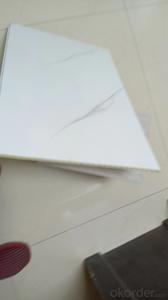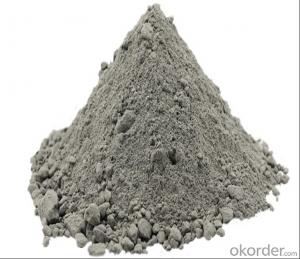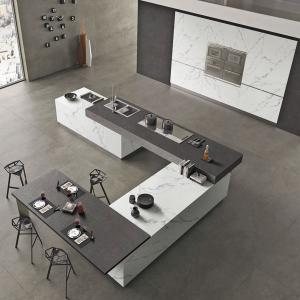TPO Waterproof Roofing Membrane Thickness with 0.8 mm
- Loading Port:
- Qingdao
- Payment Terms:
- TT OR LC
- Min Order Qty:
- 5000 m²
- Supply Capability:
- 10000 m²/month
OKorder Service Pledge
OKorder Financial Service
You Might Also Like
Product Description:
Tpo waterproof roofing membrane for sale
1.high breathable membrane
2.market:all over the world
3.resonable price
Product Main Features:
- Easy installation with good system integrity, need few accessories
- High tensile and tear strength, puncture resistance
- No plasticizer, heat aging and UV resistance, durable
- Hot-air welding, rapid welding speed, high peel strength (two times of PVC)
-No chlorine, 100% recyclable, environment friendly
- Durable hot-air welding performance and convenient maintainance
- Smooth surface, unfading and stain resistance
Product Advantages:
1. Weather resistance and durability; Excellent weld ability;
2. No any crisp agents to prevent materials brittleness;
3. Intermediate enhanced polyester mesh fabric to have high tensile strength, fatigue resistance and penetrating resistance suitable for mechanically attached roofing systems;
4. Excellent the same high and low temperature resistance as rubber materials which can keep flexible at -50° C and keep mechanical strength in high temperature;
FAQ:
Q: Can I visit your company?
A: Yes, welcome to visit our enterprise.
Q: Can I do the third party testing before loading?
A: Yes, we could accept the third party testing.
Q: Which kind of payment in your company?
A: We could accept TT, LC at sight, etc.
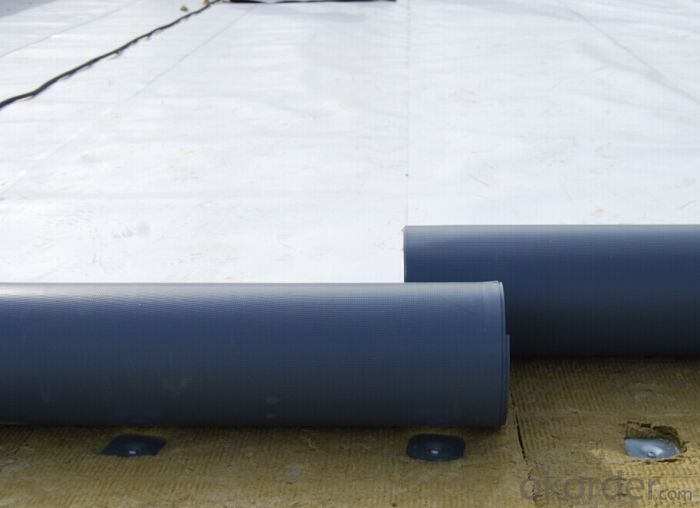
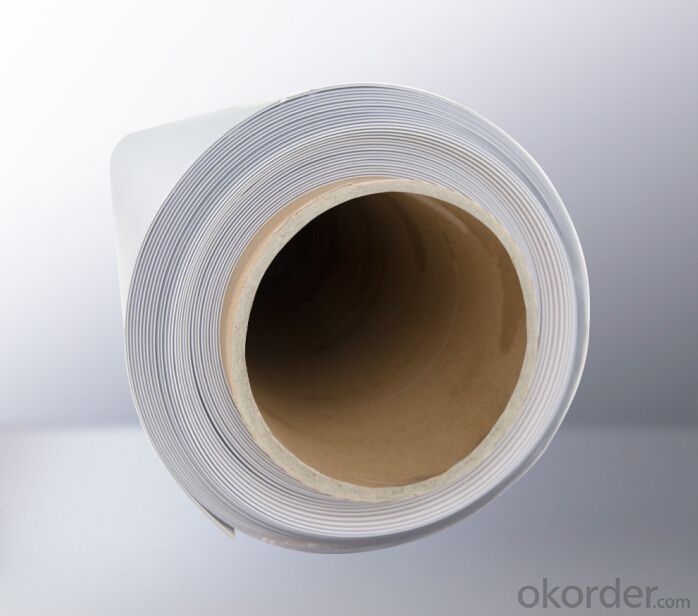
- Q:Can a waterproofing membrane be used in chemical or hazardous environments?
- Yes, a waterproofing membrane can be used in chemical or hazardous environments. Waterproofing membranes are designed to provide a protective barrier against water and moisture, and some specialized membranes are also resistant to chemicals and hazardous substances. These membranes are commonly used in industries such as manufacturing, chemical processing, and wastewater treatment plants to prevent leaks and protect against corrosion caused by chemicals. However, it is essential to select a membrane specifically designed for the particular chemicals and hazards present in the environment to ensure optimal performance and safety.
- Q:Are waterproofing membranes resistant to oil and grease?
- Yes, waterproofing membranes are often resistant to oil and grease. These membranes are designed to create a barrier against water infiltration, and many of them are also made to withstand exposure to various chemicals, including oil and grease. This resistance is typically achieved through the use of specialized materials and coatings that are able to repel or prevent absorption of oil and grease. However, it is important to note that the level of resistance can vary depending on the specific type and brand of the waterproofing membrane. Therefore, it is advisable to consult the manufacturer's specifications or seek professional advice to ensure the membrane chosen is suitable for the specific application and level of oil and grease exposure.
- Q:Can a waterproofing membrane be used for water treatment plants?
- Indeed, water treatment plants can benefit from the utilization of waterproofing membranes. These specialized membranes are specifically engineered to impede the flow of water, making them an ideal solution for safeguarding against water seepage in diverse structures, including water treatment plants. By applying these membranes to various sections of the facility, such as tanks, reservoirs, pipes, and basements, infiltration of water can be effectively prevented, thus shielding the infrastructure from potential harm. Furthermore, the implementation of waterproofing membranes aids in preserving the integrity of the water treatment process by ensuring that water remains confined within designated areas and does not permeate the surrounding soil or structures.
- Q:Can waterproofing membranes be used on shower walls?
- Yes, waterproofing membranes can be used on shower walls. These membranes are specifically designed to create a barrier against water, preventing leaks and protecting the underlying structure from moisture damage. Applying waterproofing membranes on shower walls is a common practice to ensure a watertight and durable shower enclosure.
- Q:Can a waterproofing membrane be used in conjunction with fire protection systems?
- Indeed, the utilization of a waterproofing membrane in tandem with fire protection systems is possible. Although the primary function of a waterproofing membrane is to prevent water infiltration, it can also serve as an additional safeguard against fire hazards. Numerous waterproofing membranes are engineered to possess fire-resistant qualities or exhibit fire-retardant characteristics. Consequently, they aid in impeding the spread of fire and minimizing its impact on the edifice. Furthermore, certain waterproofing membranes are specifically tailored for integration into fire protection systems, such as fire-rated roof membranes or fire-resistant sealants. These specialized membranes effectively seal off potential avenues for fire and establish a barrier to safeguard the underlying structure. In summary, the incorporation of a waterproofing membrane alongside fire protection systems contributes to the overall enhancement of a building's safety and security.
- Q:Can waterproofing membranes be applied over existing surfaces?
- Yes, waterproofing membranes can be applied over existing surfaces. These membranes are designed to adhere to a variety of materials such as concrete, wood, metal, and more. However, it is important to ensure that the existing surface is clean, free of any loose materials or contaminants, and properly prepared before applying the waterproofing membrane for optimal results.
- Q:Can a waterproofing membrane be applied to wood surfaces?
- Wood surfaces can indeed be protected with a waterproofing membrane. There are various options available in the market, including liquid or sheet membranes that are specially designed for wood. These membranes are typically made from materials like rubber, asphalt, or polyurethane, which form a barrier against water and prevent moisture from seeping into the wood. The application of the waterproofing membrane varies depending on the product, and can involve brushing, rolling, or spraying. By applying a waterproofing membrane to wood surfaces, the wood's lifespan can be extended, rotting and warping can be prevented, and water damage can be avoided. However, it is crucial to properly prepare the surface and follow the manufacturer's instructions for application in order to achieve optimal results.
- Q:How does a waterproofing membrane handle water pressure from below?
- A waterproofing membrane handles water pressure from below by creating a barrier that prevents water from seeping through. It is designed to withstand the pressure exerted by water, ensuring that it remains intact and does not allow water to penetrate into the structure it is protecting.
- Q:Are waterproofing membranes resistant to hydrostatic pressure?
- Yes, waterproofing membranes are designed to be resistant to hydrostatic pressure.
- Q:Can waterproofing membranes be used on concrete stairs?
- Concrete stairs can indeed benefit from the application of waterproofing membranes. These membranes serve the purpose of establishing a safeguarding barrier, effectively shielding the concrete from water and moisture infiltration, thus averting potential harm. By implementing a waterproofing membrane on concrete stairs, one can effectively extend their longevity, impede deterioration, and minimize the requirement for expensive repairs in the future. It is vital to select a waterproofing membrane specifically crafted for concrete usage and adhere to the manufacturer's guidelines for correct application.
1. Manufacturer Overview |
|
|---|---|
| Location | |
| Year Established | |
| Annual Output Value | |
| Main Markets | |
| Company Certifications | |
2. Manufacturer Certificates |
|
|---|---|
| a) Certification Name | |
| Range | |
| Reference | |
| Validity Period | |
3. Manufacturer Capability |
|
|---|---|
| a)Trade Capacity | |
| Nearest Port | |
| Export Percentage | |
| No.of Employees in Trade Department | |
| Language Spoken: | |
| b)Factory Information | |
| Factory Size: | |
| No. of Production Lines | |
| Contract Manufacturing | |
| Product Price Range | |
Send your message to us
TPO Waterproof Roofing Membrane Thickness with 0.8 mm
- Loading Port:
- Qingdao
- Payment Terms:
- TT OR LC
- Min Order Qty:
- 5000 m²
- Supply Capability:
- 10000 m²/month
OKorder Service Pledge
OKorder Financial Service
Similar products
New products
Hot products
Related keywords
